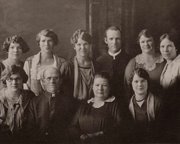Clashes fuel debate over US plan to leave IraqWrites Arango from Kirkuk, Iraq: "Many in this divided city want American troops to stay longer than the Obama administration has said they will..." A Kurdish peshmerga troop presence on the outskirts of Kirkuk has worried Arab lawmakers and Iraqi government officials, and prompted the deployment of American troops to the area.
Kurdish leaders say the peshmerga deployment was necessary to protect peaceful demonstrators from Sunni Arab insurgents.
Sheik Burhan Mizher, an Arab member of the provincial government expressed worry about the prospect of civil war after the Americans leave. Many among the diplomatic and military ranks of both countries argue for a continued American military presence beyond this year, citing Kirkuk as the centerpiece of their case, according to Arango's article.
As Arango writes, "Perhaps the greatest unfinished chapter of America's war in Iraq will be the status of Kirkuk, an ancient city that today is fought over by its three main ethnic groups, Kurds, Arabs and Turkmens, each making historical claims to the land and the oil that flows beneath."
The Kurds are the modern-day manifestation of the ancient Medes, the invaders from the north prophesied by Jeremiah in his two chapters of doom upon the land of Babylon, modern-day Iraq -- "For a nation has come up against her out of the north; it will make her land an object of horror, and there will be no inhabitant in it... The LORD has aroused the spirit of the kings of the Medes, because his purpose is against Babylon to destroy it... Summon against her the kingdoms of Ararat, Minni and Ashkenaz... the kings of the Medes..." (Jer 50:3; 51:11, 27-28).
This defeat of Babylon by the Medes includes the plundering of her treasures -- "Chaldea will become plunder; all who plunder her will have enough... A sword against her treasures, and they will be plundered... " (Jer 50:10, 37).
It seems from this article in The New York Times that the American presence is a deterrent to all out war between Iraq and the Kurds. But Jeremiah prophesies that the occupiers will abandon Chaldea, opening the way for further conflict -- "We applied healing to Babylon, but she was not healed; forsake her and let us each go to his own country, for her judgment has reached to heaven and towers up to the very skies..." (Jer 51:9).
And what seems to precipitate this abandonment is the burning of the cities -- "so the peoples will toil for nothing, and the nations become exhausted (because of the) fire" (Jer 51:58).
The fires, the abandonment, the defeat in civil war, the plundering... and then it gets really bad.
Labels: Judgment 4 - Burning, Judgment 5 - Abandonment, Judgment 6 - Civil War, Judgment 7 - Plundering




